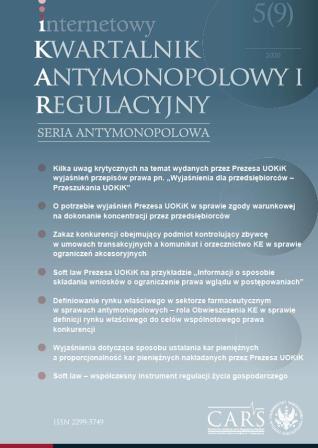Soft law – współczesny instrument regulacji życia gospodarczego
Soft law as a contemporary instrument for regulating economic life
Author(s): Monika IwaniecSubject(s): International Law, Law on Economics, Philosophy of Law, EU-Legislation, Comparative Law, Administrative Law
Published by: Wydawnictwo Naukowe Wydziału Zarządzania Uniwersytetu Warszawskiego
Keywords: coherence of the law; ‘soft law’; regulations; recommendations; interpretative and decisional instruments; steering instruments; preparatory instruments; compliance; binding force;
Summary/Abstract: This study focuses on the nature (Part II), functions (Part III) and legal effects of soft law instruments (Part IV) both in the national and international system. Its aim is to construct a theoretical and practical framework for legal compliance (in particular in the form of: guidelines, communications, compliance programmes, best practices, etc.) – in the discourse of national and EU courts. Courts do not convert soft law into hard law, but subject it to judicial interpretation and/or recognition. Recognition and binding force are used in cases where the judiciary clearly interprets – that is, agrees or disagrees with the content of the non-binding acts, or treats their content implicitly but in a circular manner – that is, without express reference to soft law instruments in the judgment, but rather more to moral, ethical norms and customs. The dynamic changes that are taking place in social life today are influencing changes that are related to the formalization of the sources of international law. Soft law should not be considered a ‘normative disease’ but rather, a symbol of the present day and a product of necessity. The strength of the state depends on the coherence of the law and the environment of non-legal regulations created, in particular, by large corporations, and which exert a significant influence on entities that conduct economic activities. Multicentricity, multisource, multi-level structure and the power of ‘soft law’ lead to the transformation of the law and changes in its functions. The aim of the article is to present the problem of applying soft law in practice, to draw attention to the ‘fictitious’ assumption that it has no binding force (in legal theory), but has a strong impact and fulfills many important functions in practice, mainly in economic law – hence its special place and role in the legal system.
Journal: internetowy Kwartalnik Antymonopolowy i Regulacyjny (iKAR)
- Issue Year: 9/2020
- Issue No: 5
- Page Range: 120-140
- Page Count: 21
- Language: Polish

